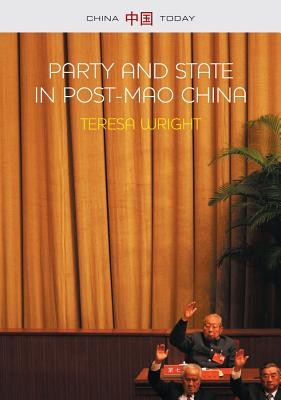
- We will send in 10–14 business days.
- Author: Teresa Wright
- Publisher: Polity Press
- ISBN-10: 0745663842
- ISBN-13: 9780745663845
- Format: 15 x 21.1 x 2.3 cm, kieti viršeliai
- Language: English
- SAVE -10% with code: EXTRA
Reviews
Description
In recent decades, China has become a quasi-capitalist economic powerhouse. Yet it continues to be ruled by the same Communist Party-dominated government that has been in power since 1949. But how has China's political system achieved such longevity? And what does its stability tell us about the future of authoritarian versus liberal democratic governance?
In this detailed analysis of the deeply intertwined relationship between the ruling Communist Party and governing state, noted China expert Teresa Wright provides insightful answers to these important questions. Though many believe that the Chinese party-state has maintained its power despite its communist and authoritarian features, Wright argues that the key to its sustained success lies in its careful safeguarding of some key communist and authoritarian characteristics, while simultaneously becoming more open and responsive to public participation. She contends that China's post-Mao party-state compares well to different forms of political rule, including liberal democratic government. It has fulfilled the necessary functions of a stable governing regime: satisfying key demographic groups and responding to public grievances; maintaining economic stability and growth; and delivering public services - without any real reduction in CCP power and influence.
Questioning current understandings of the nature, strengths, and weaknesses of democracy and authoritarianism, this thought-provoking book will be essential reading for all students and scholars of Chinese politics and international relations.
EXTRA 10 % discount with code: EXTRA
The promotion ends in 21d.04:12:21
The discount code is valid when purchasing from 10 €. Discounts do not stack.
- Author: Teresa Wright
- Publisher: Polity Press
- ISBN-10: 0745663842
- ISBN-13: 9780745663845
- Format: 15 x 21.1 x 2.3 cm, kieti viršeliai
- Language: English English
In recent decades, China has become a quasi-capitalist economic powerhouse. Yet it continues to be ruled by the same Communist Party-dominated government that has been in power since 1949. But how has China's political system achieved such longevity? And what does its stability tell us about the future of authoritarian versus liberal democratic governance?
In this detailed analysis of the deeply intertwined relationship between the ruling Communist Party and governing state, noted China expert Teresa Wright provides insightful answers to these important questions. Though many believe that the Chinese party-state has maintained its power despite its communist and authoritarian features, Wright argues that the key to its sustained success lies in its careful safeguarding of some key communist and authoritarian characteristics, while simultaneously becoming more open and responsive to public participation. She contends that China's post-Mao party-state compares well to different forms of political rule, including liberal democratic government. It has fulfilled the necessary functions of a stable governing regime: satisfying key demographic groups and responding to public grievances; maintaining economic stability and growth; and delivering public services - without any real reduction in CCP power and influence.
Questioning current understandings of the nature, strengths, and weaknesses of democracy and authoritarianism, this thought-provoking book will be essential reading for all students and scholars of Chinese politics and international relations.


Reviews